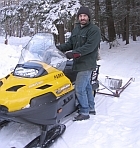 (Host) When prisoners are released from jail, they often lack the basic necessities of life: a job, transportation – even a place to live.
(Host) When prisoners are released from jail, they often lack the basic necessities of life: a job, transportation – even a place to live.
An innovative effort that involves volunteers from the community tries to fill in some of these gaps. The goal is to help the former prisoners become self-sufficient, law-abiding citizens. Budget constraints may end the program.
But as VPR’s John Dillon reports, the program has transformed the lives of both the offenders and the volunteers.
(Dillon) Early on a frosty morning, David Brunell fires up a snow machine in the woods of Montpelier’s Hubbard Park.
It’s Brunell’s job to smooth the trails for the dog-walkers and cross country skiers.
(Brunell) " ..Check all the trails in the morning, see what’s what, see what needs to be tended to, whether it needs to be raked or groomed.
(Dillon) Deep in the 185-acre park, the tall pines and hemlocks stand in dark contrast to the fresh snow. Brunell clearly relishes his work environment.
(Brunell) "I love every day of it, too. I love being outside. It feels like I’m giving back to nature. I meet all kinds of new people. It’s really great. I just love it up here…"
(Dillon) Brunell’s journey to the job he loves began a year ago – when he was released from prison after serving 19 years for second degree murder.
He’s in his 40s now – back then he was 23, he was drinking heavily and using drugs. In prison, he graduated from high school, and worked to straighten out his life.
And when the time came for his release, his caseworker connected him with a new re-entry program run out of the Montpelier Community Justice Center.
(Brunell) "They gave me the courage to keep going every day. They helped me, brought me to places where I needed to be, like my appointments, interviews for jobs, different places. Without them, I’d probably be back in."
(Dillon) People coming out of jail often don’t have jobs, money or friends that can keep them out of trouble.
In Brunell’s case, a program called Circles of Support and Accountability provided the practical infrastructure for him to begin a new, more productive, life.
As the name suggests, the volunteers provide support, but they also hold the offender accountable for his or her actions.
(Brunell) "I consider them my friends now. I can call them if I need somebody, or somebody to talk to… They’re always there for me…"
(Dillon) This isn’t a program based on altruism alone. The Corrections Department budget has grown 74% in seven years. So organizers make the case that they can save the state money in the long run.
They point out that in the past two and a half years, the Circles of Support have achieved a solid success rate in keeping people out of jail. In Washington County, 22 ex-prisoners were accepted into the program. Four dropped out for various reasons. But of the 18 that stayed with it, only one was sent back to prison on new charges. That’s a recidivism rate of 5.5%, compared to 33% for other prisoners in Vermont
But beyond the statistics, participants say the program achieves something remarkable on the individual level. The lives of the volunteers and the lives of the offenders intersect in unique and meaningful ways.
(Chickering) And it has been an enriching part of our lives… In some ways, it was like having another son to help.
(Dillon) Art Chickering is a semi-retired college professor. At 80 years old, he’s guided his own four children to successful lives. At his home on a hillside in East Montpelier, Chickering and his wife Jo talk about why they agreed to be part of David Brunell’s circle of support.
(Chickering) "We’re not interested in writing people off because they make a mistake. And people need an opportunity to redeem themselves and give back to society."
(Dillon) Their role as volunteers has ranged from providing a place to store Brunell’s car for the winter, to helping him deal with the fear and anxiety of not making it on the outside.
Jo Chickering says there’s a very practical aspect to their work: Prisoners will be released from jail, so it makes sense for society to get them re-established on the right side of the law.
(Jo Chickering) "You have to build, and work at, building your community. You can’t just say `oh that’s not part of my community,’ because that’s no longer true. So I think that if we don’t have these circles of support, then we have a lot of people going back to prison again. And this is a vehicle to get them permanently out of prison, and … paying back in so many positive ways."
(Dillon) But some might argue that society’s obligation ends at the prison gate
Eva Gumprecht is a volunteer from Adamant who works with a young man who struggles with addiction. She explains her involvement this way:
(Gumprecht) "I don’t do this because I owe him this. I don’t feel like we owe it. I’m doing this for myself and for all of us. This is someone who can be dangerous. He has been in the past. And there is absolutely nothing about being in prison that changes that… So my question is: How do we lessen the danger?"
(Dillon) Gumprecht and other volunteers say the answer is to help the offenders start new lives after they’re released.
For VPR News, I’m John Dillon in Montpelier.
Photo: Former inmate David Brunell on his snow machine.